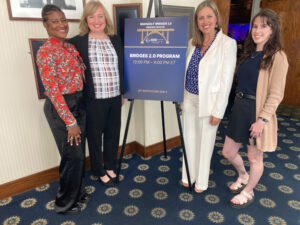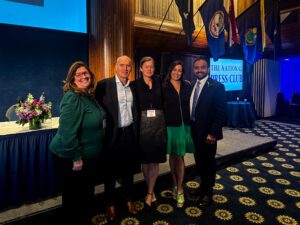On the Frontlines of Innovation in Gynecologic Oncology Research: BRIDGES 2.0 Scholars and Mentors Gather in Washington, D.C.
 On Saturday, July 26, the SGO/GOG-F BRIDGES 2.0 Research Initiative convened at the National Press Club in Washington, D.C., for a milestone gathering that brought early-career scholars face-to-face with leading experts in gynecologic oncology clinical trials. This half-day in-person event marked the second year of the BRIDGES program and highlighted the initiative’s commitment to mentorship, education, and innovation in trial design.
On Saturday, July 26, the SGO/GOG-F BRIDGES 2.0 Research Initiative convened at the National Press Club in Washington, D.C., for a milestone gathering that brought early-career scholars face-to-face with leading experts in gynecologic oncology clinical trials. This half-day in-person event marked the second year of the BRIDGES program and highlighted the initiative’s commitment to mentorship, education, and innovation in trial design.
Led by Sarah Adams, MD, of University of New Mexico, Amanda Nickles Fader, MD, of Johns Hopkins Medicine, and Thomas Herzog, MD, President of the GOG Foundation, BRIDGES 2.0 is designed to fill a critical gap in gynecologic oncology: transitioning promising research into high-quality, investigator-initiated clinical trials. Through formal training, hands-on collaboration, and deep mentorship, the program equips emerging physician-scientists with the tools needed to lead future innovations in cancer care.
The initiative is a collaboration between the Society of Gynecologic Oncology (SGO) and the GOG Foundation, a nonprofit organization dedicated to promoting excellence in clinical and basic scientific research in gynecologic malignancies. The GOG Foundation’s trials have shaped standards of care across ovarian, uterine, cervical, and other gynecologic cancers, making their support and expertise vital to the BRIDGES mission.
Attendees participated in a robust four-hour program featuring expert-led presentations, 1:1 mentoring sessions, and a panel discussion titled “Avoiding Catastrophes in the Conduct of Clinical Trials,” a candid conversation about the real-world challenges and lessons often left out of textbooks.
 Past SGO President Angeles Alvarez Secord, MD, MHSc described the event as an inspiring opportunity to collaborative shape the future of gynecologic cancer research. “SGO and GOG-Foundation are transforming early career researchers into leaders through the hands-on, second year of the BRIDGES program. Scholars dive deep into clinical trial design, development, and operations, gaining invaluable experience,” Dr. Secord noted.
Past SGO President Angeles Alvarez Secord, MD, MHSc described the event as an inspiring opportunity to collaborative shape the future of gynecologic cancer research. “SGO and GOG-Foundation are transforming early career researchers into leaders through the hands-on, second year of the BRIDGES program. Scholars dive deep into clinical trial design, development, and operations, gaining invaluable experience,” Dr. Secord noted.
For Ramez Eskander, MD, the event’s immersive nature and spirit of collaboration stood out: “The sessions were grounded in practical, real-world applications, and it was inspiring to see every attendee actively engaged and eager to learn.”
Dr. Eskander also emphasized the program’s importance in cultivating the next generation of leaders in gynecologic oncology. “By fostering early engagement, collaboration, and practical skill-building, programs like this are essential to advancing research and ultimately improving outcomes for patients with gynecologic cancers.”
He advises early-career investigators to take full advantage of every opportunity provided by programs like BRIDGES 2.0, engage actively with faculty, ask thoughtful questions, and seek out mentorship. “Most importantly, stay committed to the mission of advancing research and improving patient outcomes; your passion and curiosity are the foundation of future breakthroughs,” he offered future leaders.
As BRIDGES 2.0 continues to grow, its impact is clear: advancing evidence-based, patient-centered care through a collaborative model that invests in the next generation of clinical trialists.